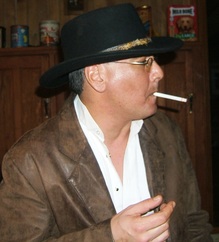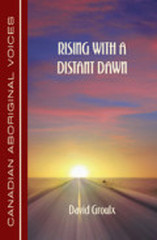 David Groulx David Groulx _ David Groulx was raised in the Northern Ontario mining community of Elliot Lake. He studied creative writing at the En’owkin Centre, BC, where he won the Simon J. Lucas Jr. Memorial Award for poetry, and was a co-winner at Harbourfront Centre’s 2011 Poetry NOW competition. He has written two previous books of poetry – Night in the Exude and The Long Dance – and has another forthcoming in 2011, Until The Bullets Rose. RUSTY TALK WITH DAVID GROULX Kathryn Mockler: What is your first memory of writing creatively? David Groulx: My first memory of writing is probably scribbling on the title pages of the books that were around the house. My home as a child was always full of books, and they were full of amazement for me; later on when I learned to read, I remember my father buying a set of Encyclopedia Britannica, leather bound gold leaf, and I used to read them, hang out at the one book store in town, and the library. I was so geeky. Writing I discovered in grade school, one to two pages stories I’d make up. I remember writing a parody of Little House On The Prairie, ‘cause I hated that show and I had to watch because my sister loved it. I remember it getting a lot of laughs. Mostly what I wrote were funny stories and then moving on to sappy pubescent love poetry. KM: What keeps you going as a poet? Or why do you write? DG: That’s a difficult question, a very difficult question, and sometimes I’ve asked myself many times ‘why torture yourself like this?’ My answers are never entirely satisfactory. For me to write poetry it is almost otherworldly, an ethereal experience. You have to be stubborn to write poetry, anything. I believe through poetry we can understand the heart, we can understand our brokenness. KM: What is the revision process like for you? DG: Really, the revision process is never ending. I mean there comes a point where you have to set down a piece and say ‘ok this is good, this is the best, I can do right here, right now.’ Otherwise I would probably still be revising. I still go back to books I’ve published and change things. My own copy is all marked in red and green ink. I suppose you could revise something until it’s crappy again. I wouldn’t call it coming full circle but twisted. I think the best tool for revising is reading it aloud to yourself. I write in the early mornings, lay it aside. The first step is to get something down, lots. I’ll put it aside and go back to it later, maybe a few weeks. And then I’ll put it aside again and maybe a few weeks after that I’ll do it again. Sometimes it’s just tweaking, sometimes it’s arm-twisting, a no-holds-barred cage fit. KM: Sometimes new writers can become discouraged by rejection or criticism of their work. How did you deal with rejection when you first started out? DG: Man, I feel like I’m still, just starting out. I believe in what I’m doing, I don’t think publishing should be a pissing contest, the poetry I write is my own journey and that may not be someone else’s idea of poetry. You got to have endurance. I believe poets and drunks only have one thing in common besides being drunks and that’s endurance. KM: Is there a writer that had a significant impact or influence on your writing? DG: I still recall Jeff Bien and his book America & Other Poems really touched me and Elias Leteier-Ruz’s Silence. Someone who also had an impact is a poet from Madagascar, Jean-Joseph Rabéarivelo. I don’t read much poetry. KM: What poets are you reading right now? DG: I’m reading some of the poetry of the Polish poet, Czesław Miłosz. And a book by the Australian writer, Anita M. Heiss, Dhuuluu-Yala To Talk Straight. KM: Do you have a piece of advice for aspiring poets? DG: The muses are wild and wily bitches and to tame them with only words, a dictionary and maybe a thesaurus; you must be a bit crazy, I suppose. And don’t take yourself too seriously, that’s a life lesson. KM: Your funniest literary moment? DG: This one actually has to do with question four: three rejection letters in one day—one from Germany—one from England—one from the States. “Never let the bastards wear you down.” KM: What are you working on now? DG: Right now I’m reworking two manuscripts. One is tentatively called, In The Silhouette Of Your Moon I Am Dreaming and the other Chant Terra Indigenia.  _DAVID GROULX'S MOST RECENT POETRY BOOK Rising with a Distant Dawn, Bookland Press, 2011 Description from Bookland Press: Rising with a Distant Dawn is a powerful and moving poetry collection, which stretches across the boundaries of skin colour, language, and religion to give voice to the lives and experiences of ordinary Aboriginal Canadians. The poems embrace anguish, pride, and hope. They come from the woodlands and the plains, they speak of love, of war, and of the known and the mysterious, they strike with wisdom, joy, and sadness, bringing us closer than ever before to the heart of urban Aboriginal life. The book captures timely personal and cultural challenges, and ultimately shares subtle insight and compassion. Comments are closed.
|
Rusty Talk
Rusty Talk Editor: Archives
November 2017
Categories
All
|

 RSS Feed
RSS Feed
